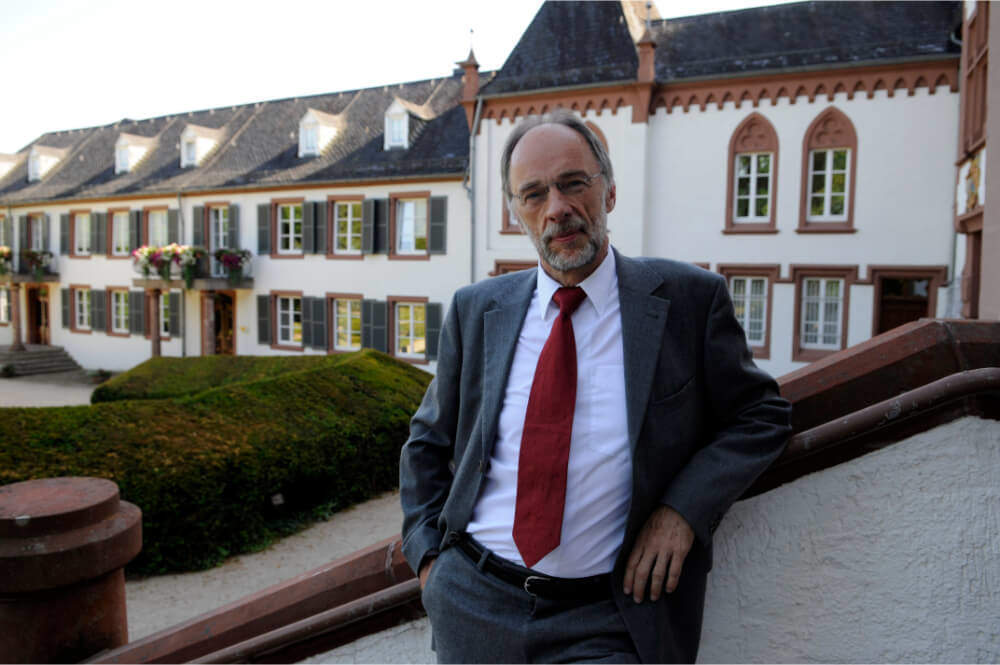Computer scientist Reinhard Wilhelm receives international award for life-long research achievements

Professor Reinhard Wilhelm in front of the Leibniz Center for Informatics at Schloss Dagstuhl © Mechthild Schneider
Real-time systems: they control processes where it is important that a program runs within a certain time window – for example in airbags, anti-lock braking systems or aircraft control systems. If calculations here were too slow by only fractions of a second, lives would be at stake. Reinhard Wilhelm, Professor of Computer Science at Saarland University, has spent many years developing automatic methods for runtime analysis in real-time systems. Thanks to his work, the correct functioning of time-critical software systems can now be guaranteed. He has now been internationally honored for this research achievement by the largest technical professional association in the world.
Reinhard Wilhelm has now received the “Outstanding Technical Achievement and Leadership Award” from the Technical Committee for Real-Time Systems of the Institute of Electrical and Electronics Engineers (IEEE), the largest technical professional association in the world. The award, which has been granted annually since 1999, is considered the most prestigious in the field worldwide. The now emeritus professor at Saarland University is the first recipient from Germany: “I am very happy about this recognition of my life’s work,” says computer scientist Wilhelm.
From 1965 to 1972 Reinhard Wilhelm studied mathematics, physics and mathematical logic at the WWU Münster as well as computer science at the TU Munich and Stanford University in the USA. In 1977 he received his doctorate from the TU Munich. Since 1978 Wilhelm has been a professor at Saarland University, where he held the chair for programming languages and compiler construction until his retirement in 2014. From 1990 to 2014 he was also scientific director of the Leibniz Center for Informatics at Schloss Dagstuhl.
His research interest is the analysis of program runtimes in real-time systems, especially the worst-case execution time (WCET), the longest possible execution time of a program. This determines whether or not a program can be executed within a given period of time. In practice, this makes it possible to predict whether an airbag will open in time, whether the tires will lock during braking, or whether all components of an aircraft control system can be activated at the right time.
Prof. Wilhelm has been researching this topic since the nineties. “The architecture of microprocessors was rapidly becoming more complex at that time, which made it enormously difficult to calculate program runtimes,” recalls Wilhelm. Nevertheless, he and his doctoral students succeeded in developing the first method for a static, both correct and precise runtime analysis. The paper published in 2001, in which the team made this breakthrough, was awarded the Test-of-Time Award of the “Embedded Systems Week” last year.
In 1998 Wilhelm founded “AbsInt Angewandte Informatik GmbH” together with some of his PhD students, in which they put their developments into practice themselves. To this day, the company still carries out analyses of safety-critical software systems for partners in the aerospace, automotive, energy and telecommunications industries.
Questions can be directed at:
Prof. Reinhard Wilhelm
wilhelm@cs.uni-saarland.de
More Information:
https://site.ieee.org/tcrts/awards/achievement-and-leadership-awards/
Background Saarland Informatics Campus:
800 scientists and about 2000 students from 81 nations make the Saarland Informatics Campus (SIC) one of the leading locations for computer science in Germany and Europe. Five world-renowned research institutes, namely the German Research Center for Artificial Intelligence (DFKI), the Max Planck Institute for Computer Science, the Max Planck Institute for Software Systems, the Center for Bioinformatics and the Cluster for “Multimodal Computing and Interaction” as well as Saarland University with three departments and 18 degree programs cover the entire spectrum of computer science.
Editor:
Philipp Zapf-Schramm
Competence Center Computer Science
Saarland Informatics Campus
Phone: +49 681 302-70741
E-Mail: pzapf@mmci.uni-saarland.de
Die Öffentlichkeitsarbeit am Saarland Informatics Campus wird unterstützt durch das Kompetenzzentrum Informatik Saarland, gefördert aus Mitteln des Europäischen Fonds für regionale Entwicklung (EFRE) und Mitteln der Staatskanzlei Saarland.


